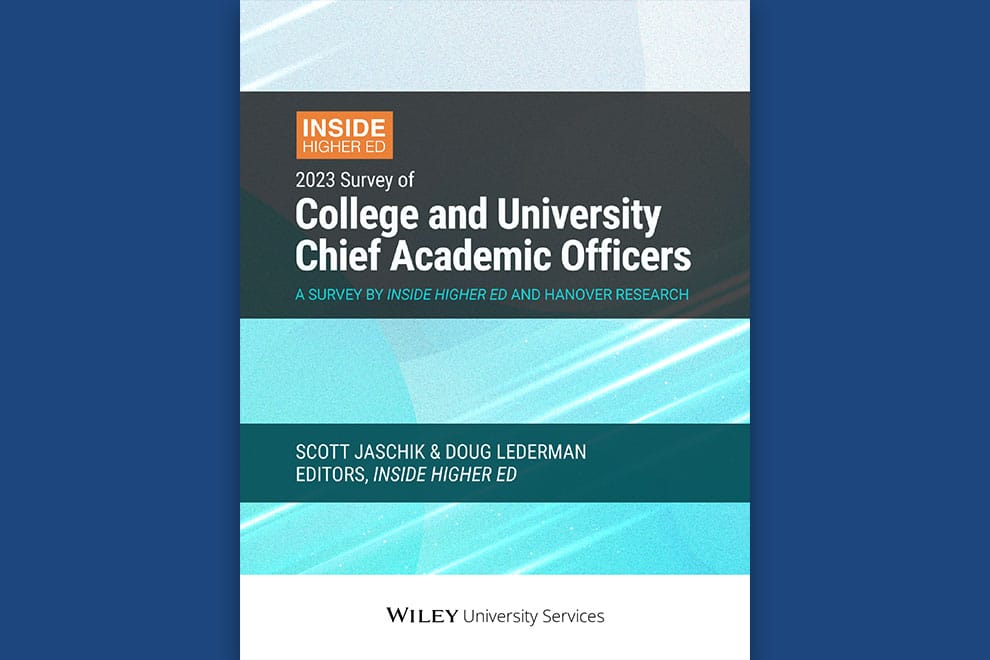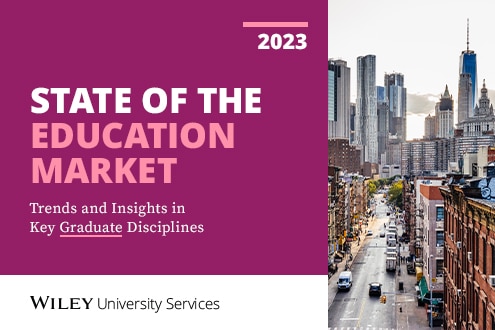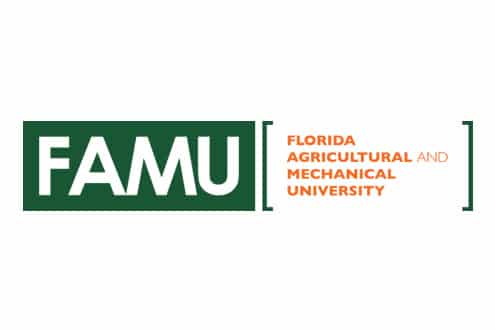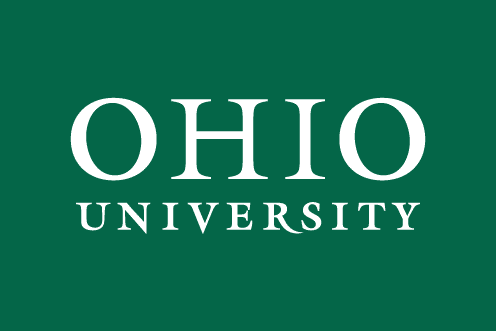Speaker 1:
You’re listening to An Educated Guest, a podcast that brings together great minds in higher ed to delve deeper into the innovations and trends guiding the future of education and careers, hosted by the President of Wiley University Services, Todd Zipper.
Todd Zipper:
Hello. I am Todd Zipper, and I am the host of An Educated Guest. On today’s show, I speak with Dr. Angela Kersenbrock, President of the Community College Baccalaureate Association, or CCBA. Angela received her undergrad and master’s degrees in nursing and worked in that field for years. She then took the leap into higher ed. An accomplished educator with experience at the associate’s, bachelor, master’s and doctoral levels, she recently retired after 34 years at Seminole State College in Florida.
Todd Zipper:
There she was a tenured faculty member, department chair, dean and the Associate Vice President of the School of Business, Health and Public Safety. In her role, Angela is focused on leading the CCBA in its mission of developing workforce baccalaureates that results in family-sustaining careers. On today’s show, Angela and I discussed the dynamic and critical relationship between higher education and industry, and the communities that they serve.
Todd Zipper:
We also dive into how the CCBA is supporting institutions and associations with efforts to increase the number of states allowing community colleges to offer baccalaureate degrees, thus increasing access to baccalaureate degrees for learners who may not otherwise have access. We touch on the impact that the COVID-19 pandemic had on those without baccalaureate degrees, and how legislators, industries and communities are responding to this impact. Finally, we talk about the concept of family-sustaining careers and innovations on the horizon for community college baccalaureates. Hello, Angela. Thank you for being here today on An Educated Guest.
Angela Kersenbrock:
Thank you, Todd. Thanks for inviting me.
Todd Zipper:
Let’s jump right in. You held different positions at Seminole State College of Florida for 20 years, and much of that was focused on career and professional programs. Can you talk a little bit about your time there, and how you have seen higher ed work hand in hand with workforce development?
Angela Kersenbrock:
I was at Seminole actually for 30 years, and some of that time as a faculty member and then moved up or down, as some might say, into administration. I was primarily initially over nursing and then health, and then one of my bosses got this great idea, well, if you can work in nursing, you can certainly do automotive. Then from automotive to IT and engineering and so on. I think that the common … We talk about what makes these programs good, what makes the program strong and rigorous and fulfill its promises to its students.
Angela Kersenbrock:
I think the biggest is working with industry and having a relationship with industry where you can call each other and talk to each other, and it’s no, this is a rubber stamp. Hey, we’re going to do this curriculum regardless of what an industry member says. I think that that is the biggest takeaway. Every program that I had was a workforce focused program. Every student we had was thinking about my career, my job, my advancement, my work. In Florida, 90 plus percent of the students stay within a three-county area.
Angela Kersenbrock:
They were, on all likelihood, going to work for somebody that that we knew, as the college knew. It’s a really dynamic relationship where you’re listening to an advisory committee member and they’re saying, “These are the skills that we really need. You all missed this last year. You’ve got to get better at this.” We work on the curriculum, we make the curriculum better, and then the student graduates and goes out there and gets a job. Then you have feedback from both the student, “This is what I learned, this is what was really helpful, This is what I think we should be doing,” and you have feedback from advisory committees.
Angela Kersenbrock:
I think that that is really the most important thing. When you say, “What do you think has changed?” I think more and more people are saying, “Oh, we need to engage with industry.” Well, career-focused vocational workforce programs have been engaging with industries since day one. I’m delighted that that recognition is out there now. But I would say the majority of our faculty, this held true to me, also came out of industry, and came and said, “I really want to teach. I want to pass on.” I think that their engagement with industry, that is the most critical thing.
Todd Zipper:
Yeah. Well, thanks for that. I think that’s a great segue to talking about the main topic of today, which is the community colleges, the innovation around getting into bachelor’s degree, which isn’t … It’s not something that’s new. It’s been going on for a couple of decades. I read this great quote from you that states, “Not everyone needs a baccalaureate, but everyone should have the opportunity.” This is really interesting, and I think where you’re going to go is talking about how it came from the needs of industry and needing that baccalaureate.
Todd Zipper:
But we talk about these hot topics of, like you just mentioned, the career connected education that increasingly becomes how we want to talk about higher ed, and like you mentioned, community colleges have been day one focused on. We also talk a lot about student debt, right? I just read that we’re eclipsing 1.6 trillion now of student debt. Certainly an area that community colleges don’t contribute as much to when you think about the cost of some of these programs, which are quite incredible in terms of their costs. But I really want to jump into this baccalaureate concept. By the way, first, you can maybe explain the difference between a bachelor’s degree and baccalaureate. Maybe those two things-
Angela Kersenbrock:
They’re the same.
Todd Zipper:
… are the same. Okay, good. One sounds a little fancier than the other.
Angela Kersenbrock:
Has a lot more vowels.
Todd Zipper:
It certainly does. How did this come about, this innovation? Why do we need it, and why is it gaining speed and momentum right now?
Angela Kersenbrock:
Okay. Let’s see. You’re right, they’ve been around for 20 plus years. Why do we need it? Community colleges, their mission is to be responsive to the communities that they live in, and also to be responsive to the industries that they serve. When industries are saying, “The world is a lot more complex now than it was in 1896, and we need people that have high level skills, we need people who can advance.” I think it makes sense some of universities and even some community college say, “Well, this is mission creep.” No, this is not mission creep. This is being responsive to the changes in our communities.
Angela Kersenbrock:
We’ll talk about policing for just a second. Policing is so much more complex today than it was 50 years ago. The complexities that a police officer faces now are very different than they were even 20 years ago. That requires a higher level of education, nursing. Healthcare has gotten so much more complex, and the patients that you see in hospitals now are much sicker. If you’re in intensive care now, you’re really pretty sick. As healthcare becomes more and more complicated, then the person who’s taking care of you, the nurse, the respiratory therapist, the physical therapist assistant need more and more education.
Angela Kersenbrock:
I like to push against, push back on when people say this is mission creep. No, this is not mission creep. It’s that the world is changing and industries are changing and people are changing. Our world is very different now. This is one way that community colleges can help respond to that. Let’s see, you ask me a three-part question. That was one part. Do you remember what the other parts were?
Todd Zipper:
Yes. I think you pretty much answered the questions. It was why did this innovation come about, which we just hit on, and why is it accelerating today? Right? Maybe you can get into … I believe it’s something like almost half of all states in America have laws that allow community colleges. It’s amazing that they have to be allowed to do something like this, but that are being allowed to do this. It does seem to be ramping up right now.
Angela Kersenbrock:
Sure. We go through periods, ebbs and flows like everything else. We’re in a period of ramping up right now. I think that that is … Community colleges, that’s communities, that’s legislators, that’s industries responding to what we’ve seen with COVID. It’s changed our society. The people who lost jobs, most of those people were people who did not have a baccalaureate degree. That’s historical. In the 2007, eight, nine Great Recession, the people who lost jobs were folks who did not have baccalaureate degrees. The people who came back and regained employment were those people who had a bachelor’s degree.
Angela Kersenbrock:
The bachelor’s degree, and I say this all the time, it’s not for everybody, because people say, “Well, vocational. People should be able to be a plumber or an electrician,” and that’s great. But maybe that person wants to own their own plumbing business, and in that case, a bachelor’s in business would be very helpful. But I think that the reason politicians, communities, industries are so much more engaged now with community college baccalaureates is because we’ve seen what this pandemic has done to whole groups of people that haven’t been able to go back to work because there isn’t a job there.
Angela Kersenbrock:
The waitress, the bus driver, all of those people, they were really hurt. Yeah, you can get as much [inaudible 00:10:11] money as you want, but at the end of the day, people really want jobs, they want meaningful and gainful employment that they’re proud of and that they can take care of their family with. Yeah, if somebody wants a bachelor’s degree, if their industry requires it, if the person wants to be able to move up, that they should have the opportunity to get a bachelor’s degree, and they should be able to get it in their communities. People live in their communities, they work in their communities, they should be able to get their degree in that community.
Angela Kersenbrock:
I told you earlier, this is my favorite subject. Here we go. We need the universities to be doing bachelor’s degrees and master’s and doctoral [inaudible 00:10:53] Absolutely, we would not be the country that we are today without our wonderful universities. People sometimes get angry at universities because they are putting up obstacles to baccalaureates. But I don’t want to do that because we really need these universities. But not every student wants to go to the university. Not every student is designed for the university. Some are designed for a smaller environment, more intimate environment, that maybe it doesn’t cost as much.
Todd Zipper:
Yeah, I want to riff off of what you’re talking about, and also highlight the research that I’m doing around this idea in California, right? They’re going through this pilot program. I think it’s been around since 2014. California, massive state, they’re projecting a shortage of 1.1 million workers with a bachelor’s degree to sustain and grow their state’s economy, right? It seems like they need all the help they can get. One of the things that I think is really worth talking about is the affordability of these programs.
Todd Zipper:
I think it was the California Legislatives Analyst’s Office, the LAO, was doing some analysis to show that the average cost was something in the under $11,000 for this bachelor’s degree, right? We’re talking about something that is dramatically lower. Let’s talk about affordability, right? From an access standpoint, obviously, this opens it up in a much different way than a typical four-year institution that is much harder. Then to sort of go off of your point, it seems like it’s very …
Todd Zipper:
I know the laws around Arizona that just got approved and even what’s going on in California, that it’s typically these four-year programs are typically relegated to, like you said, community-driven jobs that are needed. One was a bachelor’s degree in biomanufacturing which could not be more important than what we’re dealing with in today’s pandemic. It seems like really an innovation that we need more of. Any thoughts around this?
Angela Kersenbrock:
Well, you’re right. We have 24 states right now that have some kind of legislation, and then we also have states within that 24 that are expanding. Texas just recently expanded that their community colleges could have five. Ohio, they just announced an expansion that their community colleges could have more baccalaureate degrees, particularly nursing. California is going through legislation right now, and I heard from them yesterday, it passed through, we’ve got a lot of layers there, the assembly, and so it’s going on to the Senate, Appropriations Committee so to expand it to all community colleges in the state.
Angela Kersenbrock:
We see that you’re absolutely correct that we’ve got whole swaths of population that have been historically excluded from getting baccalaureate degrees and not by intention, but just because logistics and finances and so many other things. I think that that is one of the reasons why community college baccalaureates are really starting to expand. We’ve heard from other states now that are talking about it who I never thought would even be discussing community college baccalaureates.
Angela Kersenbrock:
I think the United States had a great year this year. Higher education is having a fabulous year in terms of allowing more students access to baccalaureate degrees. You’re talking about the $10,000 baccalaureate degree, which is … That’s an incredible thing. But Florida has that, Texas, and now California. I would assume Arizona will also be doing these $10,000 degrees. That makes it within reach.
Todd Zipper:
Yeah. It’s interesting how the free college movement is such a politicized issue when we’re staring in the face of something that is really close to free. Even I interviewed the president of the University of People, which is a free degree technically, but they actually pay, I think it’s $100 or $150 per assessment. Nothing is ultimately free at the end of the day. We’re sitting staring right into something that can be scaled and something that’s really important. I want to highlight a stat that I read from the Community College Research Center because it feels like it’s not just driven by market forces of jobs and the needs of hospitals or police departments, like you said, but these students want this.
Todd Zipper:
I read a quote from that center that said, “80% of entering community college students indicate they want to earn a bachelor’s degree, and yet, only 31% of them started within a six-year period when this study was done.” If you just do the math on that, and then you think about how many actually then complete that four-year degree, we’re in the 20 or below percent range. There’s a disconnect in the wants and the availability. You touched on some of these things, but what do you think some of the friction is?
Todd Zipper:
Because obviously, the four-year institutions, and we serve them at Wiley to a large degree, they’ve gone backwards, right? Meaning they’re now, a lot of them, offering associate degrees, right? And allowing folks to onboard that way, maybe not in the same exact programs. But knowing that there’s that demand, what do you think those other friction points are, and that allow community colleges, by keeping those students in their familiar territory of their community college, to finish up? What do you think is going on there?
Angela Kersenbrock:
I want to just step back a second. There’s some data that’s out there, and it’s US Department of Education, and it’s been repeated a couple of times. It shows the upper quartile, the upper income quartile in the United States, 80% of those students have a bachelor’s degree by the time they’re 24. Okay? Then the second quartile, it’s like 50%, and then it drops way down so that the lowest quartile is between 8% and 13% of those students get a baccalaureate degree. This is one of those the rich get richer, the rich get more educated, then their children get more educated [inaudible 00:17:08] We have this going on.
Angela Kersenbrock:
Certainly, the people in these last two quartiles, they’re much more high risk. Maybe their families didn’t go to college, they don’t have somebody who’s going to pay for a tutor, and all of these kinds of things. You take the student who’s most at risk, and then when you say to that student is, “Okay, you’re going to go to community college, great. Then, as harder as it was to get admitted into college, you’re going to have to do it again. You’re going to have to try to get admitted again to a university. Oh, by the way, you’ve got to apply for financial aid again. You’ve got to learn a new learning management system.” All of those things.
Angela Kersenbrock:
We take the person who’s least equipped to do that and we make them do it twice. Some things just don’t make sense. Now, universities, our partner’s UCF, Columbus State has done a great job. So many places have done a really great job of smoothing out this articulation pathway, and we want to keep doing that. We want to every day make that easier, easier, easier, smoother, smoother, smoother, but there is still some people who aren’t going to jump that. They’re not jumping that obstacle for 1,000 reasons. Those reasons, the average age of the student in a community college baccalaureate degree is 31.
Angela Kersenbrock:
When you’re 31, you might have a car payment, you might have children, you have a job maybe that you’re working a lot of hours in so you can afford college, maybe your job sends you out of town, maybe your alignment and now you’re going into Georgia because there’s a power shortage. There all these things that … It’s like playing Whac-A-Mole. You get over this one, now there’s another one, now there’s another. Now your kids got soccer practice and they’re running back and forth, and they get laid off. It’s just life really concentrated to continually interfere with the student completing that baccalaureate degree.
Angela Kersenbrock:
By being able to stay at the community college, go part time, online, in the evening or in the weekend, in a class with 24, 30 students is completely different. It’s completely different and it really helps the student to try to get through. Many of the community college baccalaureates are forming cohorts. They form a community within their classroom with that faculty member because community college faculty … I love university faculty. I’ve taught at universities. It’s fabulous, it’s wonderful, but there’s pressures to do public service, there’s pressures to do research, there’s pressures to write grants.
Angela Kersenbrock:
The pressure at the community college is help your students succeed. It’s just a different thing, and we need both systems for sure. We need both systems, but one is not more valuable than the other. But that community college baccalaureate degree, to the student who needs that bachelor’s degree who wants to stay in their community, maybe wants to stay in that job, on and on, that bachelor’s degree is invaluable, and the community college is one of the ways that they can get there.
Todd Zipper:
Yeah. It sounds like there’s just a lot of friction for that community college typical graduate at the associate level to get into that bachelor’s. The transfer credit process, like you said, there’s just all of these different barriers, from traveling to new places if it’s an on-ground type program, to getting transfer credits, and all that goes with that. You can just see that those obstacles will certainly make it challenging.
Angela Kersenbrock:
Have you tried to transfer? I got transferred a couple of times. It’s never easy and you’ve got to be fairly savvy. Somebody who’s maybe English is a second language, maybe no one in their family has gone to college, they’ve got a couple of kids, they’ve got a car payment, all these things. Now, you add that on to it. We’ve built a box that they can’t get out of, and it doesn’t help them, doesn’t help their families, and it doesn’t help our communities and our country.
Todd Zipper:
To try to understand the scale and where we are on the curve of adoption, I read that there’s about 20,000 baccalaureate degrees awarded, I think it was in the 2018-2019 school year, according to the American Association of Community Colleges, which compares to I believe two million bachelor’s degrees awarded, roughly. We’re talking about, if I’m doing my math right, 1% effectively here. We’re barely scratching the surface. I’d love to get your thoughts on, one is where are those? Obviously, we know the states relatively where it’s happening.
Todd Zipper:
Maybe there’s some states like where you are in Florida that are more ahead of the curve. But where are those pockets happening? You mentioned nursing, you mentioned the police and law enforcement and criminal justice. Where do you see other job categories happening, and what can we get this number to? Can this get to 200,000? Can get this to two million? How are you thinking about that?
Angela Kersenbrock:
Okay, the highest enrolled programs are business, IT, public safety, education, health care, nursing. Those are about the highest. If you take a look at those, those are all the jobs that are in the community. If you left your house and drove five miles, you would run into a hospital, a police station, a fire station, several businesses and all that. That’s where the jobs are. That’s one thing. I had a president one time who said … I said, “Well, we’re not doing enough. We’re not doing enough. We’re not doing enough,” and she said, “You know the starfish story?”
Angela Kersenbrock:
“No, I don’t know the starfish story.” She says, “Every time you pick up a starfish, throw it back in the ocean, yeah, you may have missed 100 others, but it really mattered to that one.” Those 20,000 students in 2018, ’19, who graduated, it really made a difference to 20,000 families. Not just the student who graduated. I had a student who said to me … His name was Carlos, and he said, “Yeah, this degree is really important for me. It’s allowed me to move up and it’s allowed me to do this.” He said, “But the most important thing is it showed my two children that they also can get bachelor’s degrees and master’s.”
Angela Kersenbrock:
That multiplication effect, that stone in a pond effect, the ripples of that. Economically, and I probably could have done this before, but it’s $20,000 times the average wage is 55,000. That’s a big number for a community. Then if you think about, okay, Carlos has two kids now, we’ll go on and get a bachelor’s degree. Those are people who aren’t going to be in jail, who aren’t going to be on assistance, who are going to live in safer neighborhoods, they’re going to have less crime in their neighborhoods, who are going to be healthier. We never talk about the health cost of not having a degree. Yeah, there’s a cost to that that we don’t even think about. Did I go off track here?
Todd Zipper:
No, you’re right on. I was trying to get at your thoughts on When the Levee Breaks. How do we get from 20,000 to 200,000? Something that the communities that you’re talking about here, the under-privileged socio economically challenged. This is the area that a lot of society corporations are talking about. There’s a solution here. The way you just described, it brings it to life. Do you think there’s just getting more states on board, showing the success of it? I think I read something like 75% of the students graduate, which is well above the normal four-year rate and certainly above the two-year rate. That’s a huge success story right there. I’m just trying to understand what are those pressure points that allow this to really start to scale?
Angela Kersenbrock:
Okay. If we look at that figure from 1890, the 20,000. If it took those students four years to get their bachelor’s degree, which is what it’s taking them, right? That’s 2014. There weren’t even that many programs in 2014. Now we’re doing a big research study with ECMC, and we were thinking there’s 123 schools, what we found now 100 … We haven’t finished counting. We’ve counted about 140 colleges now, community colleges that are offering baccalaureate degrees. We thought there are about 200 degrees. There’s more like 400 degrees.
Angela Kersenbrock:
We’re going to see this number really accelerate quickly. I think we’re going to get to a million. We are going to get to a million, and I don’t think it’s going to take that long. The other thing is more states are coming on. We had several states. We had Wyoming, we had Oregon, Washington is allowing a community college to offer bachelor’s in computer science and programming. That didn’t happen until right this legislative session. Arizona, Wyoming, California, with all those things happen, and then Pennsylvania is talking about it, New Hampshire is talking about it.
Angela Kersenbrock:
When all these other states were just starting to talk about, it happened. The philosophy of the community college is that there should be a community college within 50 miles of every student. Now the philosophy of this community college baccalaureate is there should be a community college baccalaureate degree within 15 miles of every student, and it should be accessible and affordable and all of those. Most importantly, and this is the thing that we are really the most proud of, is you’re not going to get a degree, community college baccalaureate degree, in an area where you can’t find a job. That’s not going to be the case.
Todd Zipper:
We heard it here, a million baccalaureate degrees from community college. I love it. But this actually bodes the question around cannibalization. The reason why I bring it up is I’ve been working in the online education space for 15 years, roughly. When we work with universities, still to this day, it’s one of the top questions that are asked. Well, are we going to cannibalize our existing students, if we offer this type of degree? Mostly that question’s asked when they have that existing degree in an on-campus setting.
Todd Zipper:
We separately have done a study for the last 10 years that continues to say that it’s well about 50% of that student is not going to select that school if the program isn’t online. I feel like there’s a similar analogy here, and maybe you can touch on it a little bit around the learner that goes on to get their baccalaureate at a community college. Is that a concern for that four-year institution, and now losing that potential student? Of course, society feels like it’s better off there with those completion rates, those affordability rates, but it feels like to me it’s a both end and not a cannibalization play.
Angela Kersenbrock:
I want to make sure that I understand your question. Is your question are we going to be taking away from the universities because now the student won’t go to the university? Is that-
Todd Zipper:
Yes. It’s a two-part question, or I didn’t ask this specific question around the resistance to this movement. But when I’ve been reading about it, it seems like not everybody is on board, and typically, it’s the four-year institution that’s saying, “Well, we already have public universities that do bachelor’s degrees,” right? That’s the question, right? It ultimately is do you see this being additive to … Remember, we’ve got those two million bachelor’s degree graduates every year, and we’ve got 20,000 here.
Todd Zipper:
But if we get to that one million, are we looking at three million? Are we looking at still two million? Because some of that resistance is basically saying, “Well, we already do a good job with bachelor’s degrees at public universities. No need for that.”
Angela Kersenbrock:
Okay. I always want to say public universities do a great job. We all know that. But the baccalaureate attainment rates in this country are not where they need to be, and so we don’t have enough baccalaureate degrees. Are we going to have schools that have 600,000 students in them? Is that the right answer? I don’t think so. When I speak, because I get to talk to students, a lot of students, what they say is, “I was never going to the university. I was never.” Or they say, “I tried two different universities, it wasn’t for me.”
Angela Kersenbrock:
Or they say, “I went to the parking lot, I couldn’t get any further. I turned around and went home.” The community college baccalaureate is not just for the student who I don’t ever want to go to a university. But there’s thousands and thousands of those, but it’s for the student who maybe is a little bit older. They’re not interested in football and all these other things. They’re really interested in I want to get this degree, I want to be able to go to work, I want to have a job, I want to stay in my community. You were talking about the need for how many more baccalaureate degrees just in California.
Angela Kersenbrock:
Well, I think that’s repeated everywhere. Wyoming, they’re a small state. They put in community college baccalaureate degrees, but they put it in as part of their economic development goals because they have a vision for what their state could be, and they realize we need more people with baccalaureate degrees to make that happen. I think it’s a bigger picture than … I don’t worry about cannibalization. If the worst thing happens is we have so many well educated people with great jobs, good for me, I think, right?
Todd Zipper:
Yes, absolutely. Expanding, we haven’t hit it that closely. But this student that you’re serving is, like you said, the bottom 50% or bottom quartile that need this the most. When you talked about the pandemic or the Great Recession, they were the hardest hit, the non-bachelor market, looking at that vector of things. Just going from the resistance of the movement to the realities that you need to legislate here to get these things into operation, can you talk a little bit about the Community College Baccalaureate Association that you run, and the work that you’re doing there to go from 24 or 26 states, wherever we are right now, to 50?
Angela Kersenbrock:
I told my board I wasn’t going to retire until we hit 50. I could be here for lunch. Or they may like, “Really, let’s get on this. We’ve got to get rid of her.” We’ve been in existence for 21 years. What we do as an organization is we support colleges that want to do baccalaureate degrees. We support association. The Community College Association of Illinois, of Pennsylvania, of Ohio, we support them, we give them data, we provide examples, we tell them who we think the experts are in this field and that field. We do those things. We do professional development, we bring people together to talk about ideas, and this is hard work.
Angela Kersenbrock:
It’s hard work to get it through your legislative body, it’s hard work to create the rules around it, it’s hard work to make sure you have a good baccalaureate accountability process that makes sure that baccalaureate programs are delivering on the promises that they said they were going to do. We provide support whenever somebody asks us, we provide support when people don’t ask us because we want to be helpful. I think the most important thing is being able to sit down and call someone and say, “This is what we’re trying to do. How can you help?” The most important thing, I think, from the legislative perspective are two things.
Angela Kersenbrock:
One is really good data. That is really key for legislators to have really good data. Because if they are going to oppose a university where maybe they went to school and they’ve got great tickets for football or something, they’ve got have good data. We’re always trying to position this as a this is a win for you, this is a win for the university, this is a win for the community college, this is a win for the students, because so many of the students go on for a master’s degree, so many of the faculty now go on and get a doctoral degree, and so it elevates everybody’s game.
Angela Kersenbrock:
We work with that. We create partnerships with universities to offer those doctoral degrees. We helped put two schools together, a university and a community college. They were doing a bachelor of Science in Nursing, and then created a joint Bachelor of Science and a Masters of Science in Nursing. We did another one where an MBA program went on to the community college campus and worked with the students who are getting their bachelor’s degree and many of them, then I think 29 in one year, got an MBA from Lynn University.
Angela Kersenbrock:
We do a lot of different things like that, trying to be helpful every way we can. That is what we do as an organization. We hold a conference every year, and we’re were just going to announce that probably the next two couple of … I guess Monday, we’ll announce it. It’s going to be February in Phoenix, which is a great time to be in Phoenix, but it’s going to be relaxed and we’re really going to encourage interaction and engagement and all these things.
Todd Zipper:
Do you think that the Department of Education could step in here and do some things to accelerate this trend? It seems like it’s happening locally and through state legislatures, but obviously the federal has got something called financial aid that they can wield around. What do you think on that front?
Angela Kersenbrock:
I think that’s really a good point. I love when stuff happens grassroots in a community. I think as long as the financial aid processes work for students that are in community college baccalaureate degrees, I think that that’s a great thing, and it does, it works really well. We don’t see any problems there. The feds are getting into short term certificate training, and that’s fine because we think a lot of our bachelor [inaudible 00:34:55] are a laddered approach, building credentials as you go, and that’s something that I have. I believe in those things. I think the feds are doing what they can. We have more national organizations that are coming out supporting community college baccalaureate degrees. Maybe I can get Jill Biden to come speak at our conference.
Todd Zipper:
Absolutely.
Todd Zipper:
I don’t. But I hear she’s a fan of community colleges.
Angela Kersenbrock:
Yeah. I hear she likes them. That doesn’t hurt either. Of course, that doesn’t hurt either. But I think the most beautiful thing is when industries start talking to the college and also start talking to legislators, and then the legislators start moving and making it happen in concert with the college presidents in the associations. Because then, it’s not another thing coming down from Washington, which are always unfunded mandates. Here we have to do this again. But when it’s coming grassroots from your communities, those are the things that really stay.
Angela Kersenbrock:
I was in education for 30 plus years and we had so many unfunded mandates, and they came and they went. I got to the point where I was like, “I’m not going to worry about this because in two years it’s going to be gone,” and that is what happens. But when it comes out of the community, when it grows out of community need, out of student need in your community, I think those things have a lot of staying power.
Todd Zipper:
Yeah. Talking about momentum, the pandemic accelerated a lot of different trends across the economy, certainly in education, certainly around virtual and online education. How do you think the pandemic impacted this baccalaureate movement?
Angela Kersenbrock:
There’s a quote in this grant that [inaudible 00:36:39] and I wrote that the pandemic laid bare the inequalities of this country’s economy, and I think that that’s true. When you live in an inner city and you can’t get to the university for a degree, that’s a problem. If you can get there, you don’t have the skills to really be successful or just give up or it’s too expensive, or you don’t see people in the classroom or in front of the classroom that look like you, those things create obstacles for people.
Angela Kersenbrock:
I think the pandemic really brought home who lost their jobs, and it wasn’t folks with bachelor’s and master’s and certainly not doctorate degrees. It wasn’t people who had really good current skills. They weren’t IT people. It was people who really are more blue collar, who really suffer the most in these kinds of things. I think that that and the need for nurses and the need for first responders and the need for all kinds of folks, IT zoom, and all of these things, online learning, just exploded.
Angela Kersenbrock:
I think it just said, “Hey, we’ve got a different economy here, the work from home economy, that we need everybody to be able to participate, and we’ve got huge numbers of people who are living paycheck to paycheck or not even paycheck to paycheck, that need a better way, that need family-sustaining wages which they don’t have. How do we work together to make that happen?” There were cheerleaders in the background yelling, “Community college baccalaureates. Community college baccalaureates.”
Angela Kersenbrock:
In Wyoming, that’s a great example, their coal industry was severely [inaudible 00:38:15], not in right or wrong. I’m not casting judgment on that. But because of that, Wyoming realized we’ve got to change our economy. This is not working what we’re doing here, and so what are we going to change it to and how do we get those people? Community college baccalaureates is one of the answers that they came up with. They’re putting those degrees in their community colleges. We never really talked today about the rural areas. A community makes an investment in a student from pre K all the way through high school.
Angela Kersenbrock:
Health care, home, school, all those things, and then what do they do? They leave O’Neill, Nebraska, or share it in Wyoming. I don’t know the towns. They leave, they go to the university, they go to Lincoln, and they never go back home. This community, the town fathers and mothers, have made an investment in this student and the student doesn’t come back. Yes, it was a great investment, but they really didn’t get the payoff that they need. This rural brain drain is happening. Community college baccalaureates is another way of keeping people in those rural communities, helping them get kind of skills they need to be able to survive and thrive economically in those communities.
Todd Zipper:
Another huge benefit that you’re talking about. Because I’m sure they’d love to remain where they grew up and their families are still. That’s really interesting.
Angela Kersenbrock:
Some do and some don’t. But the ones who really want to should have a way. If a student’s saying, “There’s nothing here for me. I can’t raise a family here. I can’t get a job here,” then that’s a problem for that community. That community needs to make a choice. We’re either going to do something to keep these people here or we’re going to accept the idea that we’re going to slowly die.
Todd Zipper:
Yeah. It’s amazing how vibrant universities just create this ecosystem that becomes self sustaining and a self fulfilling prophecy in a good way. The opposite of that is certainly not a good thing. You mentioned a really interesting term, family-sustaining wages. I’ve heard you talk about family-sustaining careers. Could you just touch on that a little bit because it really resonates?
Angela Kersenbrock:
I wish I made that up, and maybe I’ll convince myself that I did, but I don’t remember where I got it. It could have been from a student. But people need to make enough that they can have a family, that they can get their children into a ZIP code, where the schools are good, where there are sidewalks. Nobody gets a bachelor’s degree and then decides I’m going to go in a community that’s got a D-rated school and windows are broken. You want to give people a chance to make themselves better, and they can do that if we give people the tools.
Angela Kersenbrock:
Certainly not make it easy for people because it’s not easy to get a bachelor’s degree, but at least give them the opportunity. These family-sustaining wages is … I had this saying, listen, we’re not going to start any workforce programs that keep people in poverty, we want to put people into family-sustaining wages. You don’t want to go to school for a year, incur all this debt and become a medical assistant at $8 an hour. That’s a problem. That’s a real problem. That woman or man who’s making $8 an hour is not going to be able to care for their children financially the way they need to, or the way we all want them to. That’s what family-sustaining wages are all about, helping people make enough money, making good choices.
Todd Zipper:
Absolutely. Before we wrap up, is there any innovations that you’re seeing within your association and your travels and all this rich experience you have in the higher ed community at large that has your attention today, in addition to this baccalaureate movement you’re really pushing?
Angela Kersenbrock:
Let’s see. I think online, we’ve been doing … Baccalaureate degrees, we’ve been doing online for a long time. I think that that’s a really strong innovation that’s going to continue. I think this working with industries, I think that’s so important. I think helping students make decisions. Don’t just pick a degree where you can’t, and I think we’re doing that now. Hey, if you go to University of Miami, it’s going to cost you whatever $150,000, and you’re going to get a degree in, I don’t know, flower arranging or something. Family-sustaining wages, that is not going to be good for you. I think we’re seeing more accountability, and I think the push for completions for colleges to have performance metrics, I think that’s a really good thing. I think those are some of the things.
Todd Zipper:
I think that’s great. I’m glad you just mentioned that college having performance metrics. I’ve talked about this before, that there’s not enough transparency on what it is that the college or the program has set out to do and the students, and how is it actually performing? Are their salaries at the end of this rainbow that justify the cost? Are people completing? All that stuff you’d expect out of the metrics.
Angela Kersenbrock:
Yeah. The metrics are hard. Gosh, I hope I don’t offend anybody. Edit me out if I offend somebody. But it’s not that hard to teach an A student. Somebody who walks into a class and they get a 1380 on the SATs, they’re not that hard to teach. But somebody who’s just coming up through developmental education, English or math, you’re going to have to work a lot harder with that student, even if they are completely motivated to get them across that finish line. I think we don’t recognize that. It’s much harder to do that, and that’s why community colleges have small class sizes. But I do think that the performance metrics forces colleges, like what’s our dashboard?
Angela Kersenbrock:
How many students complete English one? How many students are completing general biology? What can we do you know? If it’s 58%, what do we do with the others, and how do we make that happen? We can’t just flesh them out. That’s not a community college mindset at all. We were calling students, “You’re not back, where are you? You weren’t in class this week, what’s going on?” “My babysitter didn’t show up,” or … You just cannot even imagine. Todd, you should teach at a community college for one semester, and you just not … It’s people that are going through the same things that you and I are going through without the resources maybe to back it up.
Todd Zipper:
That’s fair, and I appreciate that perspective. To conclude here, I asked this of all my guests, and it’s one of our core values at Wiley. We love education, and we all have learning champions that have helped us throughout our way. I guess I would ask you who has been a learning champion for you, and how is that person helped you in your life?
Angela Kersenbrock:
I’m really luckily because I had so many. I’m first time in college, first gen, and I grew up downtown in a city and didn’t think I was really going to go to college, and I had an aunt who really wasn’t even an aunt. But if you know Italians, we think everybody’s an aunt, an uncle and a cousin, who was really insistent, “No, you have got to go to college. You’ve got to do this.” This is my aunt, Edna. That was the first time I thought, “Well, yeah, I better do that.” I think if it hadn’t been for her, I’m not sure what I would have done.
Angela Kersenbrock:
I think she was a learning champion for me, and she was a teacher. She was a teacher. I’ve had some fantastic people, colleagues, people that I reported to who taught me more than I could ever even pay back. But I’ve just been so lucky on that in that way. But you also have to be curious and be willing to listen.
Todd Zipper:
Absolutely. Well, Angela, thank you so much for joining me today and being a guest with me on An Educated Guest.
Angela Kersenbrock:
My pleasure. Thank you.
Speaker 1:
Thanks for joining us on today’s episode. If you like what you’re hearing, be sure to subscribe to An Educated Guest on your listening platform so you don’t miss the latest episodes. For more information on Wiley University Services, please visit universityservices.wiley.com.





















